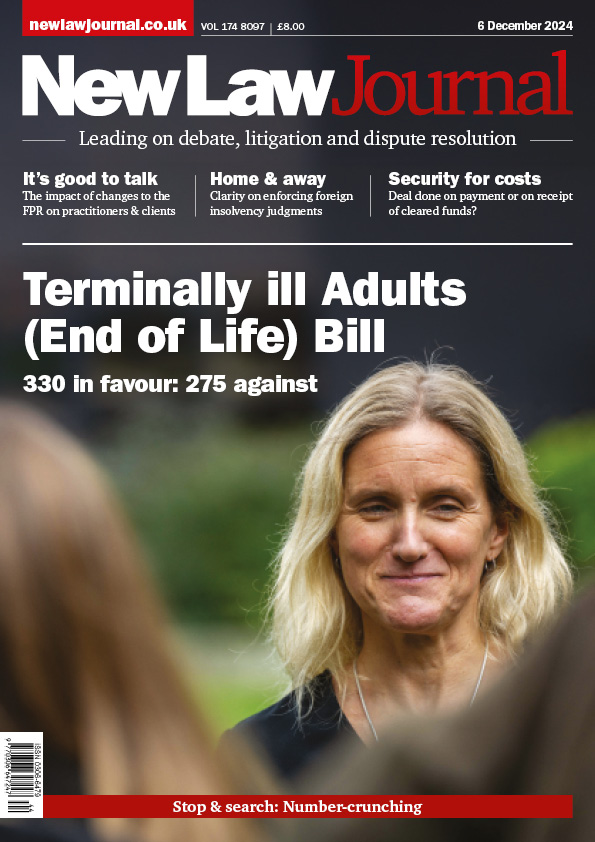THIS ISSUE

Foreign judgments can serve as the basis for bankruptcy or winding-up petitions even if not formally recognised in the courts of England and Wales, two recent judgments confirm. However, the process is not automatic, as Lauren Pardoe, partner, and Camilla Pratt, senior associate, in Rosling King’s dispute resolution group, write in this week’s NLJ.
The Family Procedure Rules (FPR) have changed. In this week’s NLJ, David Emmerson, partner at Anthony Gold, takes a detailed look at the new rulebook, particularly the powers granted by Pt 3 on case management and the use of non-court dispute resolution procedures.
The vital question of when exactly security is deemed received—whether it is on payment or on receipt of cleared funds—is addressed in this week’s NLJ, by Avneet Baryan, senior associate at Mills & Reeve.
The Terminally Ill Adults (End of Life) Bill, if passed into law in its current form, would ‘create the most tightly regulated regime, with the most safeguards, in the world where access to assisted dying is legal’, writes James Lister, partner at Stevens & Bolton, in this week’s NLJ.
How exactly are the police using their stop and search powers? In this week’s NLJ, Neil Parpworth of Leicester de Montfort University crunches the numbers and drills into the detail to uncover a less-than-rosy picture.
Bringing the assisted dying Bill into force will involve navigating a legal & ethical minefield, says James Lister
Neil Parpworth delves deep into the latest data to determine how the police are using stop & search powers
Changes to the FPR are resulting in more referrals to mediation. David Emmerson OBE explores the new provisions & their impact on practitioners & clients
The courts have provided welcome clarity on enforcing foreign judgments in English insolvency proceedings: Lauren Pardoe & Camilla Pratt outline the opportunities & challenges
Gustavo Moser sheds light on the nuances of negotiating & enforcing force majeure clauses
MOVERS & SHAKERS

Carey Olsen—Kim Paiva
Group partner joins Guernsey banking and finance practice
.tmb-mov69x69.jpg?sfvrsn=16d9dd3d_1)
Morgan Lewis—Kat Gibson
London labour and employment team announces partner hire

Foot Anstey McKees—Chris Milligan & Michael Kelly
Double partner appointment marks Belfast expansion
NEWS
The Ministry of Justice (MoJ) has not done enough to protect the future sustainability of the legal aid market, MPs have warned
Writing in NLJ this week, NLJ columnist Dominic Regan surveys a landscape marked by leapfrog appeals, costs skirmishes and notable retirements. With an appeal in Mazur due to be heard next month, Regan notes that uncertainties remain over who will intervene, and hopes for the involvement of the Lady Chief Justice and the Master of the Rolls in deciding the all-important outcome
After the Southport murders and the misinformation that followed, contempt of court law has come under intense scrutiny. In this week's NLJ, Lawrence McNamara and Lauren Schaefer of the Law Commission unpack proposals aimed at restoring clarity without sacrificing fair trial rights
The latest Home Office figures confirm that stop and search remains both controversial and diminished. Writing in NLJ this week, Neil Parpworth of De Montfort University analyses data showing historically low use of s 1 PACE powers, with drugs searches dominating what remains
Boris Johnson’s 2019 attempt to shut down Parliament remains a constitutional cautionary tale. The move, framed as a routine exercise of the royal prerogative, was in truth an extraordinary effort to sideline Parliament at the height of the Brexit crisis. Writing in NLJ this week, Professor Graham Zellick KC dissects how prorogation was wrongly assumed to be beyond judicial scrutiny, only for the Supreme Court to intervene unanimously







